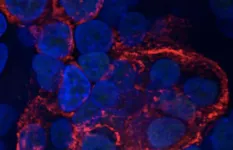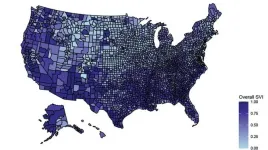(Press-News.org) What if scientists knew exactly what impact the SARS-CoV-2 virus had inside our lung cells, within the first few hours of being infected? Could they use that information to find drugs that would disrupt the virus' replication process before it ever gets fully underway? The discovery that several existing FDA-approved drugs--including some originally designed to fight cancer--can stop coronavirus in its tracks indicates the answer is a resounding yes.
A team of Boston University researchers--hailing from BU's National Emerging Infectious Diseases Laboratories (NEIDL), the Center for Regenerative Medicine (CReM) at BU's Medical Campus, and BU's Center for Network Systems Biology (CNSB)--embarked on a months-long, collaborative and interdisciplinary quest, combining multiple areas of expertise in virology, stem cell-derived lung tissue engineering, and deep molecular sequencing to begin answering those questions. They simultaneously infected tens of thousands of human lung cells with the SARS-CoV-2 virus, and then tracked precisely what happens in all of those cells during the first few moments after infection. As if that was not complicated enough, the team had to cool their entire high-containment research facility inside the NEIDL to a brisk 61 degrees Fahrenheit.
The result of that challenging and massive undertaking? The BU team has revealed the most comprehensive map to date of all the molecular activities that are triggered inside lung cells at the onset of coronavirus infection. They also discovered there are at least 18 existing, FDA-approved drugs that could potentially be repurposed to combat COVID-19 infections shortly after a person becomes infected. Experimentally, five of those drugs reduced coronavirus spread in human lung cells by more than 90 percent. Their findings were recently published in END
How coronavirus damages lung cells within mere hours
Multipronged BU research team finds 18 FDA-approved drugs that could halt coronavirus infection earlier
2021-01-29
ELSE PRESS RELEASES FROM THIS DATE:
A potentially safer, more effective gene therapy vector for blood disorders
2021-01-29
Philadelphia, January 29, 2021--Researchers at Children's Hospital of Philadelphia (CHOP) have developed a gene therapy vector for blood disorders like sickle cell disease and beta-thalassemia that is potentially safer and more effective than those currently used in gene therapy trials for those conditions. The vector, an engineered vehicle for delivering functional copies of the hemoglobin gene to correct a genetic abnormality, leads to the production of more hemoglobin with a lower dose, minimizing the risk of toxic side effects.
The findings were published today in Molecular Therapy.
"These results have many potential benefits for the successful treatment of patients ...
Black or Hispanic kids receive less medical imaging than white kids
2021-01-29
PITTSBURGH, Jan. 29, 2021 - A study led by UPMC Children's Hospital of Pittsburgh and the University of Pittsburgh School of Medicine shows that Black children are 18% less likely to get imaging tests as part of their emergency department visit compared to White children. Hispanic children are 13% less likely to have imaging done than Whites.
The researchers suggest that this disparity results from overuse in White children, though underuse in minority children probably plays a part as well. The root cause likely stems from both patient preferences and implicit bias among providers.
"Something else is going on here that's beyond the clinical, that's beyond the diagnoses," said study lead author Jennifer Marin, M.D., M.Sc., associate ...
County by county, study shows social inequality's role in COVID-19's toll
2021-01-29
In just one year, COVID-19 has killed more than 400,000 Americans, and infected more than 24 million others. But a new study shows just how unevenly those deaths and cases have played out across the country.
It finds that the more disadvantaged a county's population was before the pandemic, the higher the toll of coronavirus last spring and summer.
That level of disadvantage, measured on a standard scale called the Social Vulnerability Index (SVI), tracked closely with the number of cases and deaths per 100,000 residents in each county, according to the new University of Michigan study.
The ten-point SVI score combines many measures of the social disadvantage of a county's population, with higher scores meaning greater disadvantage. For every ...
Assessment of maternal, neonatal cord blood SARS-CoV-2 antibodies, placental transfer ratios
2021-01-29
What The Study Did: Maternally derived antibodies are a key element of neonatal immunity. This study examined the association between maternal and neonatal SARS-CoV-2-specific antibody concentrations because understanding the dynamics of maternal antibody responses to SARS-CoV-2 infection during pregnancy and subsequent transplacental antibody transfer can inform neonatal management as well as maternal vaccination strategies.
Authors: Scott E. Hensley, Ph.D., of the University of Pennsylvania in Philadelphia, and Karen M. Puopolo, M.D., Ph.D., of the Children's Hospital of Philadelphia, are the corresponding authors.
To ...
Association of social, demographic factors with COVID-19 cases, death rates in US
2021-01-29
What The Study Did: Researchers investigated the association between county-level social risk factors and COVID-19 cases and deaths, as well as weekly changes in cumulative cases and mortality, using publicly available data sets as of July 29, 2020.
Authors: Renuka Tipirneni, M.D., M.Sc., of the University of Michigan in Ann Arbor, is th corresponding author.
To access the embargoed study: Visit our For The Media website at this link https://media.jamanetwork.com/
(doi:10.1001/jamanetworkopen.2020.36462)
Editor's Note: The article includes conflict of interest and funding/support disclosures. Please see the article ...
Association between unemployment insurance, food insecurity among people who lost jobs during COVID-19 pandemic in US
2021-01-29
What The Study Did: This study investigated how unemployment insurance and a $600 per week federal supplement to unemployment insurance were associated with food insecurity among people in low- and middle-income households who lost jobs during the COVID-19 pandemic.
Authors: Julia Raifman, Sc.D., of the Boston University School of Public Health, is the corresponding author.
To access the embargoed study: Visit our For The Media website at this link https://media.jamanetwork.com/
(doi:10.1001/jamanetworkopen.2020.35884)
Editor's Note: The article includes conflict of interest and funding/support disclosures. Please see the article for additional information, including other authors, author contributions and affiliations, conflict ...
Racial, ethnic differences in diagnostic imaging at children's hospitals emergency departments
2021-01-29
What The Study Did: Researchers examined if the use of diagnostic imaging for children receiving care in pediatric emergency departments in the United States differs by race and ethnicity.
Authors: Jennifer R. Marin, M.D., M.Sc., of the University of Pittsburgh School of Medicine, is the corresponding author.
To access the embargoed study: Visit our For The Media website at this link https://media.jamanetwork.com/
(doi:10.1001/jamanetworkopen.2020.33710)
Editor's Note: The article includes conflict of interest disclosures. Please see the article for additional information, including other authors, author contributions and affiliations, conflict of interest and financial disclosures, ...
UArizona researchers develop smartphone-based COVID-19 test
2021-01-29
Researchers at the University of Arizona are developing a COVID-19 testing method that uses a smartphone microscope to analyze saliva samples and deliver results in about 10 minutes.
The UArizona research team, led by biomedical engineering professor Jeong-Yeol Yoon, aims to combine the speed of existing nasal swab antigen tests with the high accuracy of nasal swab PCR, or polymerase chain reaction, tests. The researchers are adapting an inexpensive method that they originally created to detect norovirus - the microbe famous for spreading on cruise ships - using a smartphone microscope.
They plan to use the method in conjunction with a saline swish-gargle test developed by Michael Worobey, ...
How vitamins, steroids and potential antivirals might affect SARS-CoV-2
2021-01-29
Evidence is emerging that vitamin D - and possibly vitamins K and A - might help combat COVID-19. A new study from the University of Bristol published in the journal of the German Chemical Society Angewandte Chemie has shown how they - and other antiviral drugs - might work. The research indicates that these dietary supplements and compounds could bind to the viral spike protein and so might reduce SARS-CoV-2 infectivity. In contrast, cholesterol may increase infectivity, which could explain why having high cholesterol is considered a risk factor for serious ...
Territorial, expert navigators: The black howler monkeys of Mexico
2021-01-29
An international team of researchers led by Oxford Brookes University shows that black howler monkeys in Mexico not only remember where important events took place in their habitat, but also when to return to such locations.
The researchers recorded the behaviour of five groups of black howler monkeys accumulating over 3,000 hours of field observations at Palenque National Park, southern Mexico.
Expert fruit foragers
Black howler monkeys were observed navigating deliberately towards out of sight fruit trees that were ripening. Fruit is a desired food by many animals in rainforests so being able to anticipate when fruit is going to be available and where, is a great strategy to forage ahead of competitors. ...
LAST 30 PRESS RELEASES:
Scientists reveal our best- and worst-case scenarios for a warming Antarctica
Cleaner fish show intelligence typical of mammals
AABNet and partners launch landmark guide on the conservation of African livestock genetic resources and sustainable breeding strategies
Produce hydrogen and oxygen simultaneously from a single atom! Achieve carbon neutrality with an 'All-in-one' single-atom water electrolysis catalyst
Sleep loss linked to higher atrial fibrillation risk in working-age adults
Visible light-driven deracemization of α-aryl ketones synergistically catalyzed by thiophenols and chiral phosphoric acid
Most AI bots lack basic safety disclosures, study finds
How competitive gaming on discord fosters social connections
CU Anschutz School of Medicine receives best ranking in NIH funding in 20 years
Mayo Clinic opens patient information office in Cayman Islands
Phonon lasers unlock ultrabroadband acoustic frequency combs
Babies with an increased likelihood of autism may struggle to settle into deep, restorative sleep, according to a new study from the University of East Anglia.
National Reactor Innovation Center opens Molten Salt Thermophysical Examination Capability at INL
International Progressive MS Alliance awards €6.9 million to three studies researching therapies to address common symptoms of progressive MS
Can your soil’s color predict its health?
Biochar nanomaterials could transform medicine, energy, and climate solutions
Turning waste into power: scientists convert discarded phone batteries and industrial lignin into high-performance sodium battery materials
PhD student maps mysterious upper atmosphere of Uranus for the first time
Idaho National Laboratory to accelerate nuclear energy deployment with NVIDIA AI through the Genesis Mission
Blood test could help guide treatment decisions in germ cell tumors
New ‘scimitar-crested’ Spinosaurus species discovered in the central Sahara
“Cyborg” pancreatic organoids can monitor the maturation of islet cells
Technique to extract concepts from AI models can help steer and monitor model outputs
Study clarifies the cancer genome in domestic cats
Crested Spinosaurus fossil was aquatic, but lived 1,000 kilometers from the Tethys Sea
MULTI-evolve: Rapid evolution of complex multi-mutant proteins
A new method to steer AI output uncovers vulnerabilities and potential improvements
Why some objects in space look like snowmen
Flickering glacial climate may have shaped early human evolution
First AHA/ACC acute pulmonary embolism guideline: prompt diagnosis and treatment are key
[Press-News.org] How coronavirus damages lung cells within mere hoursMultipronged BU research team finds 18 FDA-approved drugs that could halt coronavirus infection earlier




